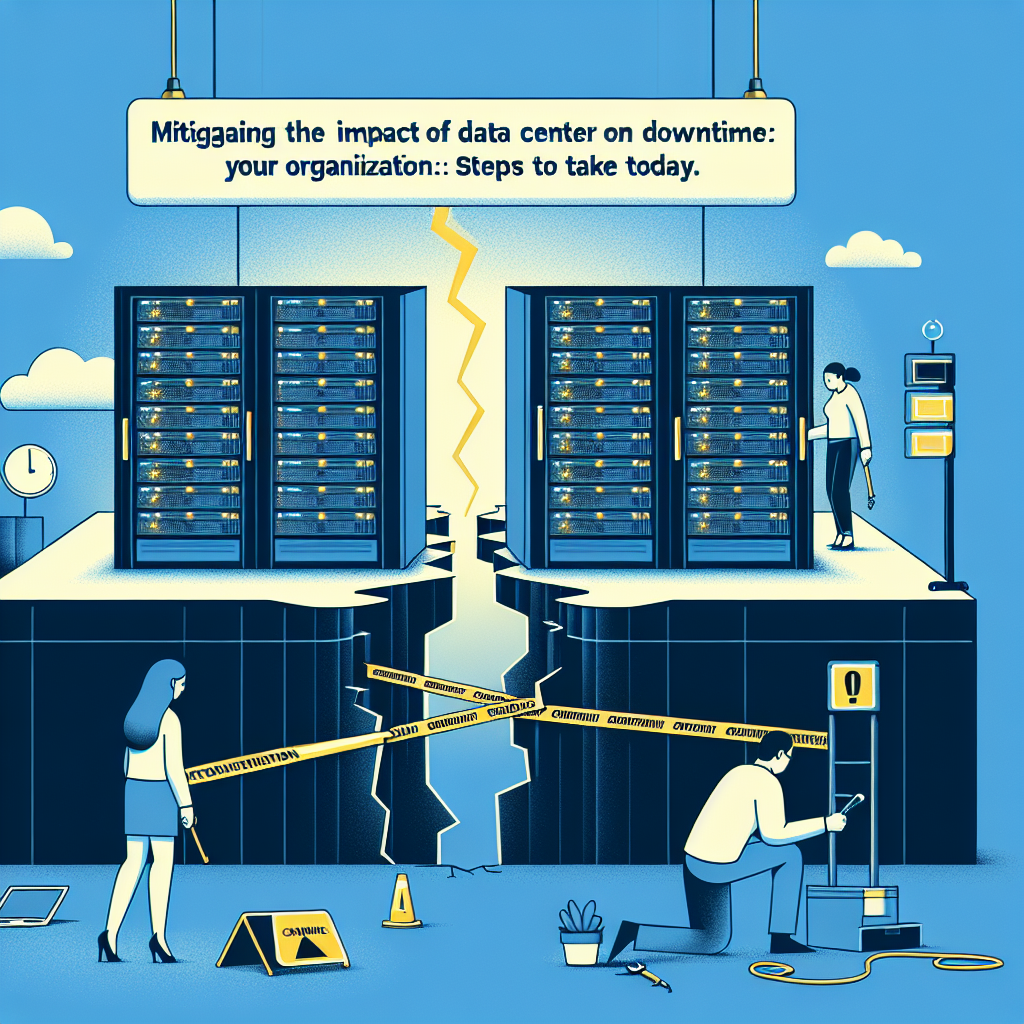Your cart is currently empty!
Tag: Organization

Top Strategies for Ensuring Data Center Compliance in Your Organization
Data center compliance is a crucial aspect of any organization’s operations, as it ensures that the data being stored and processed within the facility meets industry regulations and standards. Failure to comply with these regulations can result in hefty fines, legal repercussions, and damage to the organization’s reputation. To avoid these pitfalls, organizations must implement strategies to ensure data center compliance. Here are some top strategies to consider:1. Conduct regular audits: Regular audits of your data center’s operations and processes are essential to ensuring compliance with industry regulations. These audits should be conducted by a third-party auditor who is knowledgeable about data center compliance requirements. The auditor will assess the data center’s security measures, data protection protocols, and overall compliance with industry standards.
2. Implement robust security measures: Data security is a top priority for data center compliance. Implementing robust security measures such as firewalls, encryption, access controls, and monitoring systems can help protect sensitive data from unauthorized access or breaches. Regularly updating security measures and conducting security assessments are also important to stay ahead of potential threats.
3. Develop and enforce data retention policies: Data retention policies dictate how long data should be stored within the data center and when it should be securely disposed of. Developing clear and enforceable data retention policies can help ensure compliance with regulations regarding data storage and privacy. Regularly reviewing and updating these policies to reflect changes in regulations or industry standards is also crucial.
4. Train staff on data center compliance: Employees who work in or around the data center should be trained on data center compliance requirements and best practices. Providing regular training sessions on data security, privacy regulations, and compliance protocols can help ensure that staff members are aware of their responsibilities and how to handle data securely.
5. Monitor and report compliance metrics: Monitoring compliance metrics such as data access logs, security incidents, and regulatory changes can help organizations stay on top of their data center compliance efforts. Reporting these metrics to key stakeholders within the organization can provide transparency and accountability for compliance efforts.
In conclusion, ensuring data center compliance is a critical aspect of any organization’s operations. By implementing strategies such as conducting regular audits, implementing robust security measures, developing data retention policies, training staff on compliance, and monitoring compliance metrics, organizations can protect sensitive data, avoid legal repercussions, and maintain a strong reputation within their industry. By prioritizing data center compliance, organizations can ensure the security and integrity of their data operations.

Top Reasons Why Your Organization Should Invest in Data Center Audits
In today’s digital age, data has become one of the most valuable assets for organizations. As such, it is crucial for companies to ensure that their data is secure, reliable, and easily accessible. One way to achieve this is by investing in data center audits.Data center audits are comprehensive assessments of a company’s data center infrastructure, processes, and security measures. These audits are conducted by certified professionals who evaluate the organization’s data center operations and identify potential risks and vulnerabilities.
There are several reasons why your organization should consider investing in data center audits. Here are the top reasons:
1. Ensure Data Security: Data breaches and cyber-attacks are on the rise, posing a significant threat to organizations of all sizes. Data center audits help identify security vulnerabilities and weaknesses in your data center infrastructure, allowing you to take proactive measures to protect your data from unauthorized access.
2. Improve Data Center Efficiency: Data center audits can help identify inefficiencies in your data center operations, such as underutilized resources, outdated equipment, and inefficient cooling systems. By addressing these issues, you can optimize your data center’s performance, reduce operational costs, and improve overall efficiency.
3. Ensure Compliance with Regulations: Many industries are subject to strict data protection regulations, such as GDPR, HIPAA, and PCI DSS. Data center audits help ensure that your organization’s data center operations comply with these regulations, reducing the risk of non-compliance penalties and legal repercussions.
4. Identify Risk Factors: Data center audits help identify potential risks and vulnerabilities that could jeopardize your organization’s data integrity and availability. By addressing these risks proactively, you can minimize the likelihood of data loss, downtime, and other costly disruptions.
5. Enhance Disaster Recovery Planning: Data center audits can help evaluate your organization’s disaster recovery plans and procedures, ensuring that you have robust backup and recovery mechanisms in place to minimize downtime and data loss in the event of a disaster.
6. Increase Stakeholder Confidence: Investing in data center audits demonstrates your organization’s commitment to data security and reliability, which can help build trust and confidence among customers, partners, and other stakeholders.
In conclusion, data center audits are essential for organizations looking to safeguard their data, optimize their data center operations, and comply with regulations. By investing in data center audits, you can identify and address potential risks, improve efficiency, and enhance data security, ultimately ensuring the long-term success and resilience of your organization.

Choosing the Right DCIM Solution for Your Organization: Tips and Considerations
In today’s digital age, data centers play a crucial role in the operations of organizations of all sizes. With the increasing complexity and scale of data center operations, it is essential for businesses to have a robust Data Center Infrastructure Management (DCIM) solution in place to ensure efficient and effective management of their data center resources.Choosing the right DCIM solution for your organization can be a daunting task, as there are numerous options available in the market. To help you make an informed decision, here are some tips and considerations to keep in mind when selecting a DCIM solution for your organization:
1. Define Your Requirements: Before starting your search for a DCIM solution, it is important to clearly define your organization’s requirements and objectives. Consider factors such as the size and complexity of your data center, the number of assets you need to manage, and the specific features and functionalities you require in a DCIM solution.
2. Scalability: It is important to choose a DCIM solution that can scale with your organization’s growth. Look for a solution that can accommodate your current needs as well as future expansion plans, without requiring a complete overhaul of your existing infrastructure.
3. Integration: A good DCIM solution should be able to integrate seamlessly with your existing IT systems and tools. Look for a solution that offers easy integration with other software applications, such as monitoring and management tools, to ensure a smooth and efficient data center operation.
4. User-Friendly Interface: The user interface of a DCIM solution plays a key role in its usability and adoption within your organization. Choose a solution that offers a user-friendly interface that is easy to navigate and understand, even for non-technical users.
5. Reporting and Analytics: A robust reporting and analytics feature is essential for gaining insights into your data center operations and making informed decisions. Look for a DCIM solution that offers comprehensive reporting capabilities and customizable dashboards to track key performance metrics and trends.
6. Vendor Support and Maintenance: When choosing a DCIM solution, consider the level of support and maintenance provided by the vendor. Ensure that the vendor offers timely updates and patches, as well as responsive customer support to address any issues or concerns that may arise.
7. Cost: Cost is an important factor to consider when selecting a DCIM solution for your organization. Compare pricing plans and licensing options from different vendors to find a solution that fits within your budget while offering the features and functionalities you need.
By keeping these tips and considerations in mind, you can make an informed decision when choosing the right DCIM solution for your organization. With the right DCIM solution in place, you can streamline your data center operations, improve efficiency, and ensure the optimal performance of your organization’s IT infrastructure.

Fowooyeen 2 Pack Bathroom Cabinet Organizer, 2 Tier Pull Out Under Sink Organizers and Storage, Multi-Purpose Kitchen Pantry Medicine Organization and Storage Shelves Bins with Movable Dividers Grey
Price: $26.99
(as of Dec 20,2024 20:17:31 UTC – Details)
To calculate the overall star rating and percentage breakdown by star, we don’t use a simple average. Instead, our system considers things like how recent a review is and if the reviewer bought the item on Amazon. It also analyzed reviews to verify trustworthiness.Learn more how customers reviews work on Amazon








